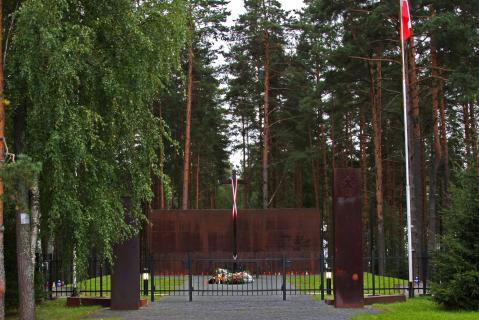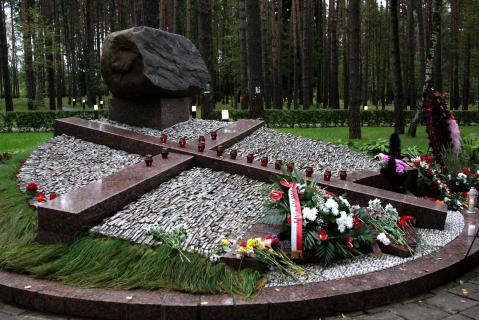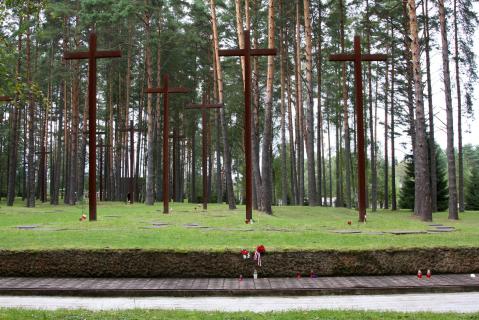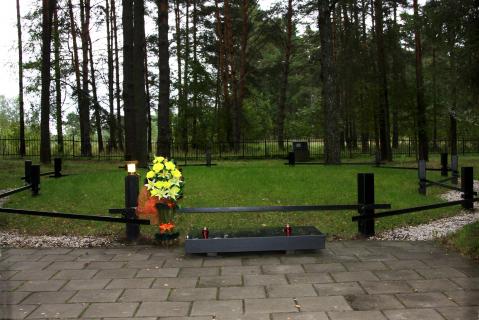The Mednoe memorial complex is located 32 kilometres from Tver and two kilometres west of Mednoe village, not far from the main Moscow-St Petersburg Highway. In the 1930s, only in the 1940s, some sources suggest, the Kalinin (Tver) Region NKVD had its recreation area there. Its status as a closed and guarded KGB base for rest and recreation was preserved until the early 1990s.
At Mednoe were buried the bodies of those shot during the Great Terror (1937-1938) in cases under the control of the Kalinin Region NKVD. Some reports indicate that the bodies of those sentenced to death in the Kalinin Region before 1937 and up to 1943 were also interred there. In 1940 prisoners from Ostashkovo camp, Polish citizens arrested in September 1939 on the territories then “liberated” by the USSR, were buried in common pits after being shot in Kalinin (Tver) Prison.
The first unofficial excavations at the NKVD recreation area near Mednoe were made by activists of Tver Memorial in 1989 when the territory was still off limits and guarded. An exhumation was conducted between 15 and 29 August 1991 by a group of investigators from the Main Military Prosecutor’s Office with the participation of Polish experts and in the presence of representatives of Memorial. Further exhumations in 1994 and 1995 were conducted by Polish experts alone. 25 burial pits were discovered. At present the Polish side has established the names of 6,296 inmates of the Ostashkovo camp who were shot in Kalinin.
The exact number of Soviet citizens buried near Mednoe is unknown. The FSK (predecessor of the FSB) and the Tver Region prosecutor’s office investigated the places where the executed victims of political repression were interred and their findings, published on 9 February 1995, concluded that there were mass burials of victims of political repression in the Tver (Kalinin) Region. In 1998-1999 the Edelweiss exploratory group and Mednoe staff made exploratory excavations in the territory of the memorial complex and located four large pits. A variety of sources confirmed that these were burials of the victims of political repression in the 1930s. During these investigations other unnamed burials were uncovered, such as the graves of 296 Soviet soldiers who died in nearby evacuation hospitals and first aid stations. Their graves were not opened and the remains were not exhumed.
The first memorial erected in the grounds of the former KGB sports area was a plaque “To our compatriots, victims of war and repression”, unveiled on 7 June 1995. On 11 June that year the foundation stone of the future Polish memorial cemetery was laid. The Mednoe Memorial Complex arose in fulfilment of the 22 February 1994 Agreement between the Russian and Polish governments about burials and memorial sites of the victims of war. Mednoe opened on 2 September 2000. From 2003 until 2011 it was an affiliated subsidiary of the State Museum of Russian Political History. Since then, it has been an affiliate of the State Central Museum of Russian Contemporary History in Moscow.
*
The official website of the Mednoe Complex states clearly that the memorial commemorates both Soviet victims of political repression in the 1930s-1050s and executed Polish POWs (see Tver [69-01]) who were held in the NKVD’s Ostashkovo camp. On 30 October 2022, however, the annual commemorative event was apparently dedicated (see website announcement in bibliography below) exclusively to Soviet victims and no mention was made of the 6,300 Polish buried there.
On 30 October 2023 the complex admitted visitors free of charge to lay flowers on the memorial to “Compatriot victims of war and repression”. One addition to the site since 2022 were busts of Soviet leaders: Kirov, Stalin, Kalinin, Sverdlov, Dzerzhinsky and Lenin.
A Book in Remembrance of the Victims of Political Repression of the Kalinin Region (4 vols. 2000-2015) includes biographical entries on 9,400 who were shot or sent to the camps.
Zuzanna Gajovniczek, Bernadetta Gronek and others, Mednoe: A record of the Polish military graveyard (two vols), , Warsaw, 2006 (print run 1,500 copies). Vol. 1, A-L, pp 1-522; Vol. 2, M-Z, pp 523-1099. A list of Polish POWs from the Ostashkovo camp who were shot in April and May 1940 in Kalinin (Tver) and lie buried at the Polish military cemetery in Mednoe; more than 6,300 names. [ in Polish: Miednoje – Księga cmentarna polskiego cmentarza wojennego / Zuzanna Gajovniczek, Bernadetta Gronek i inny / Rada ochrony pamięci walk i męczeństwa. Warszawa : RYTM, 2006. 1500 egz. (T. 1 : A — Ł. LXXXIII, 522 s. : il.; T. 2 : M — Ż. XI, 523–1099 s. : il.)]
| Date | Nature of ceremonies | Organiser or responsible person | Participants | Frequency |
|---|---|---|---|---|
|
2-3 September
|
Day of Remembrance and Sorrow
|
Mednoe Memorial Complex
|
Annual Event
| |
|
30 October
|
Remembrance Day for the Victims of Political Repression
|
Mednoe Memorial Complex
|
Annual Event
| |
|
1 November
|
All Souls Day
|
Mednoe Memorial Complex
|
Annual Event
|
| State of burials | Area | Boundaries |
|---|---|---|
|
Еach of the 25 common graves is marked with a tall metal cross. In the Russian part of the complex two common graves, of two burials each, are marked
|
14 hectares
|
Тhere is a fence around the memorial complex
|
[ original texts and hyperlinks ]
Alexei Pamyatnikh, “55 photos from the Mednoe excavations in 1991”, Katyn materials [retrieved, 29 May 2022]
“Findings of the work by Tver Region FSK and the regional prosecutor’s office to locate mass burials of the victims of political repression”, Tver Region FSB archive, 9 February 1995
Katyn, March 1940-September 2000 – Shooting, The fate of the living, The echo of Katyn: Documents, N.S. Lebedeva (compiler), Moscow, 2001 (688 pp)
V.A. Basayev, “Everyone needs to remember the unjustly executed”, Book of Remembrance of the Victims of Political Repression in the Kalinin [Tver] Region, Vol. 1, 2001
T. Kosinova, “In the shadow of Katyn”, polit.ru, 3 June 2008
Along the Paths of Memory: A guide to places in Tver and the Tver Region linked with repressive political measures in the 1930s and 1940s, Tver, 2009 (28 pp)
“The Mednoe Memorial Complex”, Virtual Museum of the Gulag [retrieved, 29 May 2022; no longer accessible]
*
“The Day in Remembrance of the Victims of Political Repression”, the Museum of Contemporary Russian History, 30 October 2022 [retrieved 26 October 2023].
“A bust of Stalin has been erected at a complex in memory of the Victims of Political Repression”, Kholod, 1 October 2023 [retrieved 31 October 2023].




